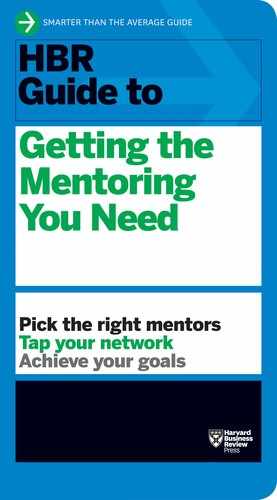Chapter 9
How to Get More from Your Mentors
by Jodi Glickman
A senior publishing executive at William Morris once told me how baffled she was when an aspiring literary agent asked her to be a mentor. She looked at me and said, “She’s got to make me want to be her mentor. Isn’t she supposed to do something for me?” The answer is a definitive yes.
Mentors can provide valuable insight into your organization, inside information about the politics of the place, and useful over-the-shoulder advice about which people to work with and which ones to avoid. But to get all that and more, you’ve got to figure out how to repay the favor and make the relationship work for both of you.
We’re all busy. Like you, your mentors have competing demands on their time and resources. They might let mentoring fall by the wayside when they’re closing a deal, bringing a new product to market, or putting out a fire for an important client. That’s why you, as the mentee, must make your mentors’ investment in you worth their time and energy.
Here are four ways to provide value to your mentors— and receive more in return.
- Keep their interests on your radar so you can share relevant ideas and articles or provide access to resources. Talia, a coaching client of mine, knew her mentor Fred was keen to create a diverse workplace in the male-dominated financial industry. (Names in this article are disguised.) Shortly after she had interned at his investment management firm as a college student, she decided to pursue a career in an entirely different field—but she still valued his feedback and advice, so she kept the mentoring relationship going. In return for Fred’s ongoing guidance, Talia looked for ways to help him recruit female talent. She promoted his firm to her career center on campus and referred potential interns to him. She also introduced him to various women’s groups at her university and sent him articles and blog posts about why women were—or weren’t—seeking financial jobs. Fred appreciated the introductions and the market intelligence, and continued to counsel Talia on positioning herself and speaking to her skill set as she carved out her new career path. He even tapped his network and put her in touch with several people in her new industry of choice.
- Provide insight into the rank and file of your organization. Your mentor may feel out of touch with the cubicle culture, as leaders often do. You can help by sharing your peers’ reactions to new social-media restrictions at the office, for example. Or, like Margot, a nonprofit program manager, you can explain that your fellow employees have been wanting a flextime policy for ages and offer yourself up as an organizational experiment. Margot’s boss and mentor, Bruce, lobbied for her flextime arrangement (the organization’s first) and had real skin in the game: If Margot’s performance suffered as a result of her working at home one day a week, so would his reputation. But the experiment went well, and Bruce asked Margot to put together a proposal on his behalf for a firm-wide flextime policy. Bruce earned points with colleagues for being forward-thinking and became known as an accommodating (and desirable) boss. He also benefited from Margot’s continued loyalty: She was always willing to put in extra time and energy whenever he needed help moving something new through the organization.
- Participate in activities and programs your mentor cares about. Perhaps one of your mentors does a lot of college recruiting for your firm and runs a leadership development program. Why not offer to accompany her on a recruiting trip or suggest speakers for her leadership program? Consider Caroline, a magazine copy editor who took a special interest in her mentor’s “lunch and learn” series, a lineup of informal lectures by guest experts from various fields. Caroline made a point of flagging speakers who were in town for her own alumni events and took the initiative to book several of them for the brown-bag series. Soon her mentor turned the entire series over to her—and Caroline received high marks on her performance review for helping to promote learning in the organization.
- Buy ’em lunch. At the very least, if you really struggle to find ways to add value, take your mentors to lunch or dinner (one at a time, of course). Even if they try to foot the bill, be firm and generous in your offer. Let them know that you appreciate their help and it’s your pleasure to be able to return the favor in some small way. A nice glass of wine and a good meal goes a long way toward building goodwill.
____________
Jodi Glickman, founder and president of the communication training firm Great on the Job, is the author of Great on the Job (St. Martin’s, 2011).
Adapted from content posted on hbr.org on September 23, 2009
